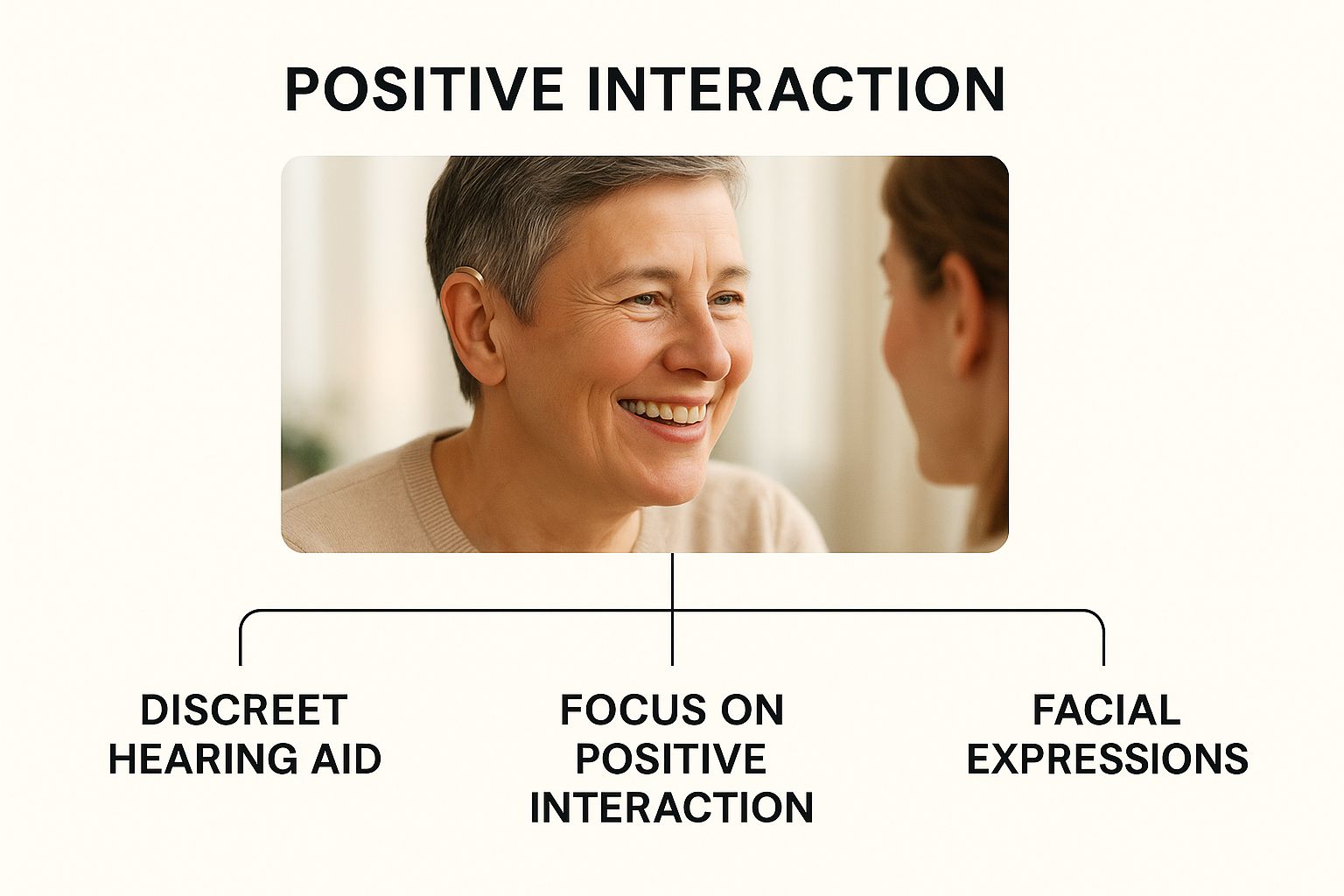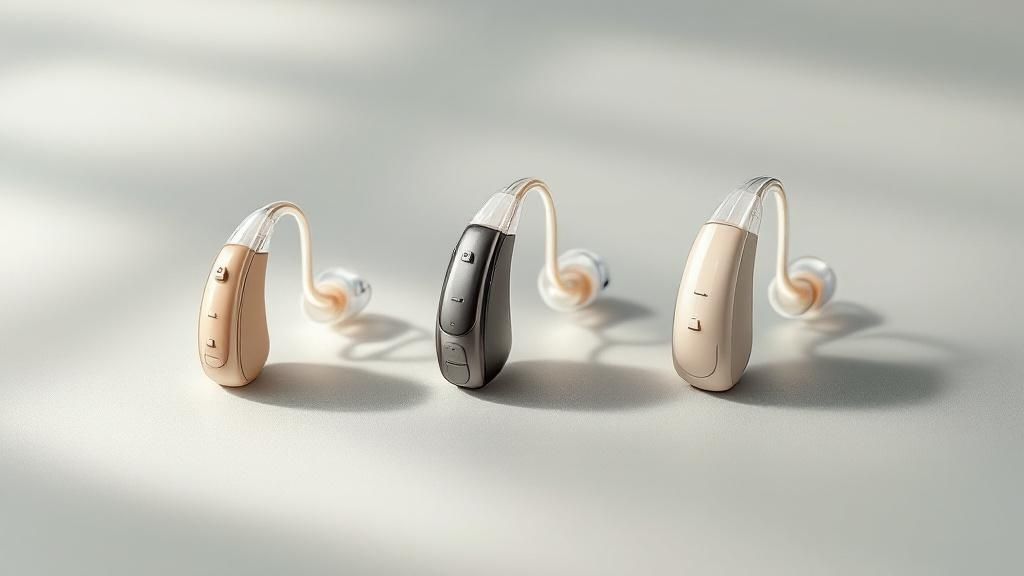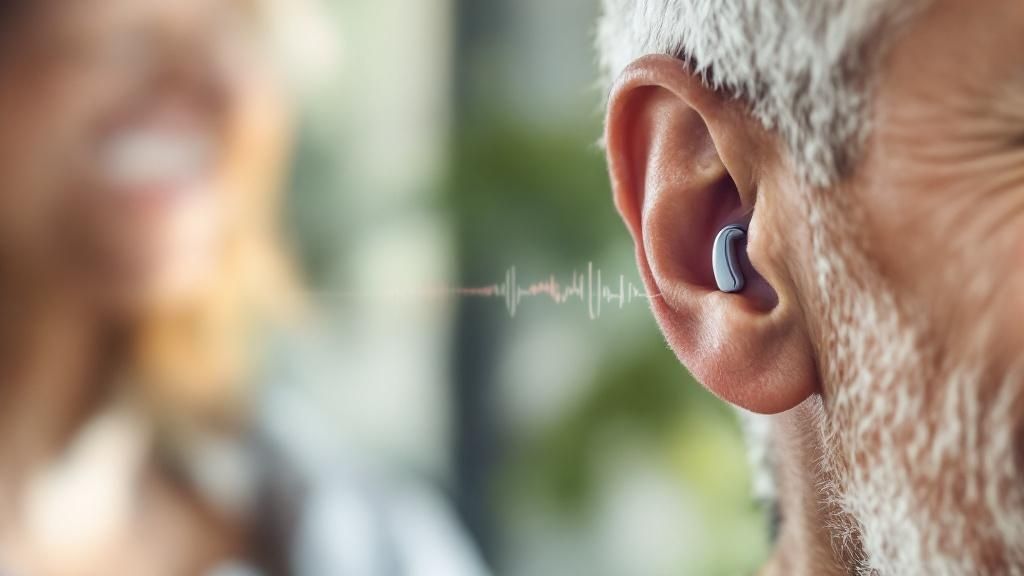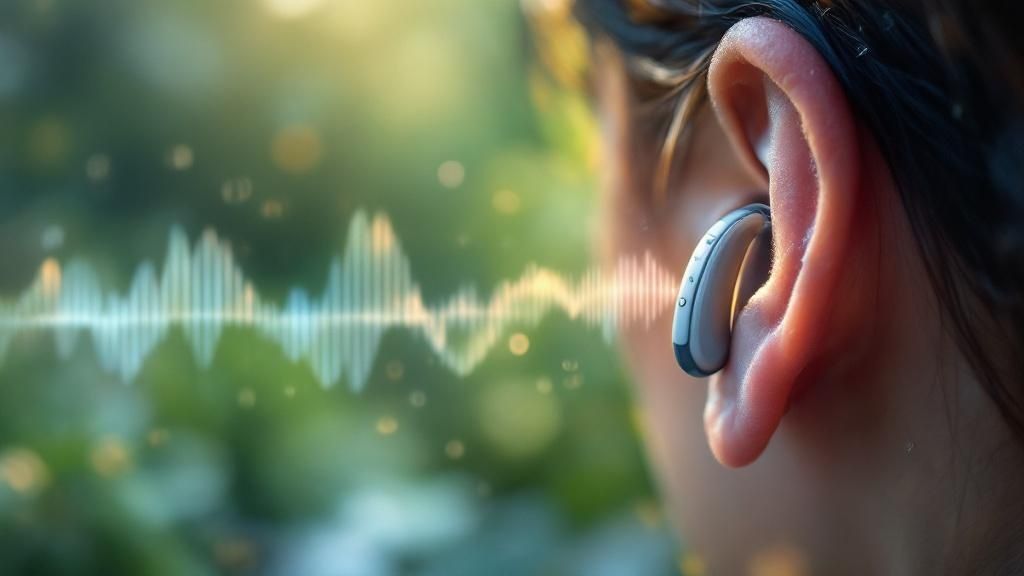It starts with a whisper you almost miss. A joke that doesn't quite land because you missed the setup. The punchline, lost in the clatter of a restaurant. You ask your partner to repeat something, just one more time. You tell yourself, they're just mumbling. But what if it's not them? What if the soundtrack of your life is slowly, almost imperceptibly, losing its sharpness? The truth is, hearing aids for mild hearing loss are designed to catch these quiet moments before they become a wall of silence, bringing back the crisp, vibrant detail you didn't even realize you were missing.
From a Whisper to a Worry: The Unseen Clues of Mild Hearing Loss
Have you found yourself in a conversation, your head nodding, a smile fixed on your face, while inside, you're desperately trying to piece together the fragments you did hear? Have you ever felt that flash of irritation when the TV volume that sounds perfect to you is suddenly a roaring distraction for everyone else? These aren't just quirks. They are echoes. The first whispers of a subtle, yet profound, change.
Mild hearing loss isn’t a sudden darkness. It's a slow-motion fade. Imagine looking at your favorite photograph, but a fine layer of dust has settled over the glass. You can still see the big picture, but the vivid colors, the sharp lines, the soul of the image… it’s all gone soft. The world’s volume knob has been turned down by a single, invisible click.
Why Life’s Soundtrack Starts to Blur
This slow fade isn't a mystery; it's biology. Deep within your inner ear, thousands of tiny, delicate hair cells vibrate with sound. Over time, some of these cells can become damaged, making it harder for your brain to register the softer, higher-frequency notes of life. This is precisely why the gentle chirp of a bird, the rustle of leaves, or the clear, bright voices of children are often the first things to disappear.
It isn't that you've stopped hearing. It's that you've stopped hearing completely.
And you are not alone in this feeling. Roughly 15% of adults in the United States experience this quiet drift, a subtle disconnect from the world they once knew.
The true trick of mild hearing loss is its power of deception. It will convince you that everyone else is the problem—they need to speak up, the restaurant is too loud, the actors are mumbling—when the real change is happening inside you.
Are You Ignoring the Clues Your Senses Are Sending?
Because the signs are so quiet, they are dangerously easy to dismiss. You might not even realize that these small, daily frustrations are all pointing to the same place. This table isn't just a list of symptoms; it's a mirror. See if you recognize yourself in these moments.
| You Might Be Experiencing… | What It Feels Like In Your World | Where It's Quietly Stealing Your Clarity |
|---|---|---|
| Trouble in a Crowd | Following a story in a busy restaurant becomes a mental marathon. You're catching words, not moments. | Bustling cafes, lively family dinners, work meetings, any place where life is happening. |
| The "What?" Reflex | You find yourself saying "What?" or "Sorry?" so often it's become a habit, even when it's quiet. | One-on-one conversations, phone calls, intimate moments with loved ones. |
| The "Mumbling" Illusion | It seems like everyone around you, especially women and children, has suddenly forgotten how to speak clearly. | Watching your favorite TV show, listening to your grandkids, hearing a public speaker. |
| The Volume Divide | The TV volume that feels comfortable to you has become uncomfortably loud for the rest of the family. | Movie nights, watching the evening news, sharing a space with others. |
| Phone Call Strain | You press the phone hard against your ear, straining to catch every word, often defaulting to speakerphone. | Crucial work calls, catching up with old friends, everyday communication. |
| Social Burnout | You leave parties feeling utterly exhausted, not from the fun, but from the sheer effort of listening. | After work, post-social events, or even just a long day of navigating the world. |
Did a flicker of recognition cross your mind? Seeing your own experience in this mirror is the first, most powerful step toward reclaiming what you've lost.
The Question That Changes Everything
This slow drift away from clarity doesn't just affect your ears; it affects your soul. You might find yourself retreating, smiling and nodding through conversations where you feel completely lost. Perhaps you've started saying "no" to invitations, not because you don't want to go, but because the effort to participate is simply too draining.
For a deeper look into these signs, our complete guide on what is mild hearing loss can illuminate even more.
So, the question isn't whether you have a "problem." The question is this: "Is this what's been happening to me?" Answering that honestly is how you begin to bring your world, and your life, back into brilliant focus.
Erase the Old Picture: Today’s Hearing Aids Are a Revelation
When you hear the phrase "hearing aid," what image flashes in your mind? Is it that clunky, beige banana-shaped thing whistling behind your grandfather's ear?
Take that image, and throw it away. It’s as outdated as a flip phone in a world of supercomputers. The evolution of hearing technology isn't just an upgrade; it's a complete reimagining of what's possible.
Consider this. A corded wall phone used to do one thing: make calls. Today, the device in your pocket connects you to the entire universe of human knowledge, streams symphonies, and guides you across continents. That is the same monumental leap that separates yesterday's hearing aids from the technology available right now.
From Awkward Device to Intelligent Ally
Modern hearing aids have shed their skin. They are no longer clumsy amplifiers. They are discreet, powerful micro-computers designed for one thing: restoring clarity. Many are so astonishingly small they vanish completely into the ear, making your hearing your own private business.
But the real revolution isn't their size. It's their soul. It's their intelligence.
Instead of just making everything louder, today's devices listen to the world with you. They can instantly identify the voice you want to hear in a chaotic room and lift it out of the noise, bringing the conversation into sharp relief while gently turning down the clatter around it.
This is what makes them the perfect solution as hearing aids for mild hearing loss. They don't shout. They restore. They intelligently reintroduce the crisp, high-frequency sounds that have faded away—the very sounds that give speech its clarity and life its texture.
The goal is no longer amplification. It is restoration. The mission of modern hearing technology is to give you back the effortless, natural listening you remember, so conversations feel like a connection, not a calculation.
The Hidden Genius Behind Effortless Hearing
Today’s devices are infused with technology that was once the domain of science fiction. These breakthroughs have made hearing aids not just smaller and smarter, but deeply intuitive. It's this fusion of power and simplicity that has ignited a revolution in hearing care. You can see how technology is shaping the hearing industry on fortunebusinessinsights.com and understand the monumental shift that's happening.
Here are the secrets to their magic:
-
Bluetooth Connectivity: Imagine this. Your hearing aids become a private, wireless headset. You can stream a phone call, a favorite podcast, or a piece of music directly into your ears, with a clarity that feels like it’s being beamed directly into your mind.
-
Artificial Intelligence (AI): Your hearing aids are constantly learning. Their smart algorithms scan your environment hundreds of times per second, automatically adapting as you move. Walk from a silent library into a roaring city street, and they will adjust instantly, seamlessly, without you ever lifting a finger.
-
Effortless Recharging: The days of fumbling with tiny, frustrating batteries are over. Modern hearing aids rest in a sleek, portable charging case. You simply drop them in at night, and in the morning, they are ready for a full day of crystal-clear sound.
These are not just gadgets. They are bridges back to the world. They are designed to weave themselves so perfectly into your life that you forget they're even there, empowering you to lean into every moment, every conversation, without a second thought. So, forget the past. The future of hearing is already here.
Your Personal Blueprint: Unlocking the Features That Will Change Your World
Entering the world of hearing aids can feel like being handed a pilot's manual—a blizzard of technical terms and features that leave you feeling more confused than empowered. But here is the secret: you don't need to know everything. You only need to know what will truly make a difference for you.
Consider this your personal decoder. We’re going to cut through the jargon and shine a light on the core technologies that will have the most profound impact on your experience with mild hearing loss. This isn't about finding the device with the most bells and whistles; it's about finding the one with the right ones to bring your life back into focus.
The image below captures the true purpose of this technology—to make human connection feel easy and joyful again.

It’s about being fully present for the people who matter most, without the constant strain.
The Spotlight and the Shield: The Two Pillars of Clarity
For mild hearing loss, two features rise above all others. Think of them as your personal sound engineers, working in perfect harmony to make every word count.
First, there is the magic of directional microphones. Imagine you’re at a dinner party. An old hearing aid would just turn up the volume on the entire scene—the clinking silverware, the music, the six other conversations happening around you. It’s more noise, not more clarity.
Directional microphones are different. They act like a sonic spotlight. They intelligently focus on the sound coming from directly in front of you, bringing the speaker's voice to the forefront while the sounds from the sides and back gently fade away. Suddenly, the only conversation that matters is the clearest thing in the room.
Working in perfect sync is noise reduction. This is your shield. While the microphones are spotlighting the speech, this algorithm is actively hunting down and silencing distracting background noise. The drone of an air conditioner, the rush of traffic, the low hum of a crowd—it all gets dialed down, leaving speech pure and clear.
Together, these two features create a new reality. They don't just make sound louder. They make speech crisper and listening effortless, lifting the heavy burden of mental fatigue that comes from a day spent straining to hear.
Your Lifestyle, Your Features: What's Essential vs. What's Extra
Once that foundation of clarity is in place, other features can add layers of convenience that are tailored to the life you lead. The key is to separate the absolute essentials from the nice-to-have bonuses.
This table is your guide. It's designed to help you align your personal challenges with the technology that solves them.
| Feature | The Simple Magic It Performs | Who Needs This the Most? |
|---|---|---|
| Directional Microphones | Acts like a spotlight, focusing on the person you're talking to and dimming the rest. | Anyone who wants to conquer noisy restaurants, social events, or busy offices. |
| Noise Reduction | Functions as a shield, softening background chatter and hum to let speech shine through. | Everyone. But especially if you feel mentally drained by noise and constant listening effort. |
| Rechargeable Batteries | Lets you power up your hearing aids overnight in a simple case, ending the hassle of tiny batteries. | People who crave convenience, have trouble with small objects, or prefer a sustainable option. |
| Bluetooth Streaming | Transforms your hearing aids into a personal sound system, streaming calls and music from your phone. | Anyone who loves technology, takes frequent phone calls, or enjoys listening to music and podcasts. |
| Tinnitus Masking | Plays a gentle, therapeutic sound to make the frustrating experience of ringing in the ears less noticeable. | Anyone who experiences that persistent ringing or buzzing sound known as tinnitus. |
Armed with this understanding, you can now look at any list of hearing aids for mild hearing loss with confidence. You can see past the marketing and choose a device based on one simple question: "Will this make my life better?"
Which Path Will You Take? Charting Your Course to a Clearer World

You now understand the quiet clues of hearing loss and the revolutionary technology that awaits. The next step feels momentous, but it's simpler than you imagine. There are two primary roads to better hearing, and your choice depends on a single question: what do you value most?
This is not a test with a right or wrong answer. It is an exploration to find the path that feels designed for you—for your comfort, your lifestyle, and your spirit. Let’s illuminate both journeys so you can see your own reflection in them.
To guide us, let's follow two people, David and Sarah. Both have felt the world grow quiet, but their instincts lead them down different paths. Their stories will light your way.
David’s Path: The Way of the Trusted Guide
David is a man who values expertise and precision. He wants the unwavering certainty that comes from a professional who can map his unique hearing fingerprint and craft a perfectly bespoke solution. For him, the journey begins with an audiologist.
This is the traditional path, built on a foundation of deep diagnostics and personal care. David undergoes a comprehensive hearing evaluation, resulting in a detailed audiogram—a precise map of his hearing abilities. An audiologist then uses this map to recommend and meticulously program prescription hearing aids for mild hearing loss.
The advantages for David are profound:
- Deep Personalization: His hearing aids are tuned to the exact frequencies where he needs support.
- Ongoing Expert Care: He has a dedicated professional for adjustments, maintenance, and long-term support.
- Medical Oversight: This path is crucial if there are any underlying medical issues connected to his hearing loss.
This white-glove service comes at a premium, reflecting the value of professional expertise and bundled care. It is the perfect path for someone who wants the ultimate level of customization and is prepared to invest in it.
Sarah’s Path: The Way of Empowered Choice
Now, let's meet Sarah. She's a savvy, confident individual who is comfortable managing her own health with the help of modern technology. She wants a premium solution that is efficient, accessible, and doesn't require juggling appointments. She chooses the Over-the-Counter (OTC) path.
The OTC market has sparked a revolution in hearing health, delivering exceptional, FDA-registered devices directly to consumers. Sarah can research, select, and purchase her hearing aids online. They arrive at her doorstep, ready to transform her hearing right out of the box.
This path is about empowerment. OTC hearing aids are specifically designed for adults with perceived mild to moderate hearing loss, offering a streamlined, affordable, and powerful way to reclaim clarity.
For Sarah, the benefits are life-changing:
- Radical Convenience: No appointments, no waiting. She gets a world-class solution on her own schedule.
- Incredible Value: By removing the layers of a traditional clinic, OTC options often cost a fraction of the price.
- Total Control: She can fit, adjust, and manage her devices herself, embracing her autonomy and independence.
This path is ideal for people like Sarah who have a clear sense of their needs and want a direct, effective solution. If you feel a connection to her story, our guide on how to choose hearing aids could be an invaluable next step.
Beyond hearing aids, many people find other modern tools can help. For instance, as part of a strategy to ensure you never miss a word, you might want to explore different speech-to-text applications that can offer support in certain situations.
In the end, it doesn't matter if you see yourself as a David or a Sarah. Both paths lead to the same beautiful destination: a world alive with rich, clear, vibrant sound.
This Isn't About Your Ears; It's About Your Life
Making the decision to address mild hearing loss is so much more than buying a piece of technology. It is a declaration. It is a conscious choice to step back into the full color of your life—a life where you are an active participant in every conversation, every joke, every secret whispered in a quiet moment. It's one of the most powerful acts of self-investment you can make.
When you restore clarity to your hearing, you are doing more than just turning up the volume. You are protecting your brain. When left untreated, hearing loss forces your brain to work overtime, straining to make sense of a muffled world. This constant mental effort leads to exhaustion and has been scientifically linked to a higher risk of cognitive decline.
Choosing to wear hearing aids is a proactive strike against cognitive aging. It is a way to strengthen your social connections, rebuild your confidence, and invest in your long-term brain health. It is a commitment to your future self.
You Are Part of a Global Awakening
If you are considering this step, know that you are at the forefront of a massive global movement. Millions of people are waking up to the critical importance of treating hearing loss early. This is no longer a hidden issue; it has become a central pillar of proactive wellness.
You can see this awakening in the market's incredible growth. The global hearing aids market, valued at around USD 9.76 billion in 2024, is projected to skyrocket to nearly USD 18.74 billion by 2034. That explosive growth isn't about gadgets; it's about a fundamental shift in how we view health. You can explore the data behind this market expansion on towardshealthcare.com.
This is not about admitting a deficit; it is about claiming a power—the power to live a life without compromise. For older adults, finding the right tool is especially transformative, and the options have never been better. If you are starting this journey, our guide on affordable hearing aids for seniors is a perfect place to begin.
You may have started this article asking, "Do I really need this?" But once you understand the profound connection between clear hearing and your cognitive vitality, your relationships, and your overall well-being, the question begins to change. It becomes, "Why would I wait another day?" This isn't a decision about what you might be losing. It is a decision about everything you are about to get back.
The Final Questions Before You Begin Your New Chapter
You've walked through the subtle signs, witnessed the astonishing technology, and mapped out your potential paths. Yet, it's completely natural for a few final, practical questions to be echoing in your mind.
Let's confront those lingering doubts head-on. These are the real-world concerns everyone has before taking this life-changing step, and finding clarity here is the final piece of the puzzle.
Are OTC Hearing Aids Truly "Good Enough" for Mild Hearing Loss?
For a vast number of people, the answer is an emphatic yes. Over-the-Counter (OTC) hearing aids were conceived and designed precisely for adults who perceive their hearing loss as mild to moderate. They represent an excellent, powerful, and incredibly accessible first step.
These devices are engineered for you to fit and fine-tune on your own, and they can deliver a dramatic improvement in the situations where you need it most, like hearing every word around a dinner table.
What's the trade-off? They lack the microscopic level of customization that an audiologist can provide after a full diagnostic screening. Think of OTC aids as a superb, high-performance "ready-to-wear" solution. For straightforward needs, they are a revolutionary choice. If you suspect your hearing situation is more complex, a professional consultation remains the ultimate gold standard.
The Elephant in the Room: Will People Notice?
This is perhaps the biggest fear, but it’s a fear rooted in the past. Modern design has made this concern virtually obsolete. The clunky, obvious devices of a bygone era have been replaced by sleek, miniature marvels of technology that are, in some cases, literally invisible.
Today's most sought-after styles, like Receiver-in-Canal (RIC) or Completely-in-Canal (CIC) aids, are masters of disguise. They are so tiny they tuck away behind or inside your ear, with colors designed to blend seamlessly with your hair and skin tone.
Here is the simple truth: people are far more likely to notice when you miss the punchline or seem disengaged from a conversation than they are to ever spot a tiny piece of sophisticated technology. The focus will instantly shift from what you might be wearing to how wonderfully present and connected you are.
What Is the Real Cost of Reclaiming My Hearing?
The world of hearing aids for mild hearing loss now offers a broad spectrum of price points, which is fantastic news. It means that brilliant hearing is no longer a luxury; it's an accessible reality.
-
Over-the-Counter (OTC) Aids: This path has democratized hearing care. You can find outstanding pairs of OTC hearing aids ranging from a few hundred dollars to just over $1,000.
-
Prescription Aids: These are the devices provided through an audiologist's clinic. They represent a significant investment, often ranging from $2,000 to over $7,000 per pair. This higher cost isn't just for the devices themselves. It is a comprehensive package that includes the audiologist's professional services: in-depth testing, precision fitting, follow-up adjustments, and long-term care.
The choice comes down to the kind of value you are seeking. Do you want a world-class device that you can manage with confidence and independence? Or do you prefer a full-service, guided experience with continuous expert support? Either way, a clearer, richer, more vibrant world is waiting for you.
At HearDirectClub, we believe hearing clearly isn't a privilege—it's a right. Our mission is to bring you premium, self-fitting hearing aids directly, eliminating the high costs and complexities of a traditional clinic. Experience the transformation for yourself with our 100-day risk-free trial.



Leave a comment
This site is protected by hCaptcha and the hCaptcha Privacy Policy and Terms of Service apply.